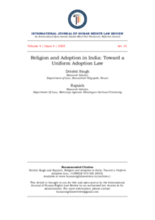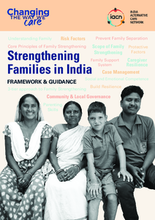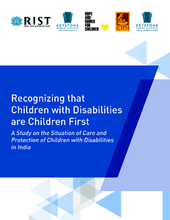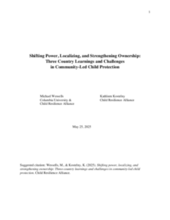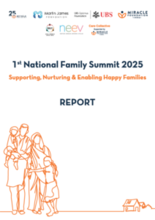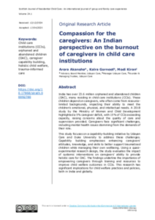childrens_living_arrangement
children_living_without_bio
Displaying 11 - 20 of 427
This study explores the experiences of exploited orphans in institutional care in India and the factors that contribute to their cognitive resilience, using qualitative interviews with 20 children aged 12–16. Findings show that resilience is shaped by problem-solving skills, goal setting, self-regulation, peer support, education, and stable caregiving, highlighting the need for policies and interventions that strengthen both individual and environmental supports.
India’s adoption laws have evolved over more than a century, creating parallel systems that affect eligibility, speed of adoption, and the rights of adoptive families. This study examines the historical origins and gaps in these laws and advocates for a unified framework that aligns with constitutional and international standards.
Strengthening Families in India: Framework & Guidance, jointly developed by India Alternative Care Network (IACN) and Changing the Way We Care (CTWWC), aims to consolidate existing knowledge, interventions, and promising practices led by government bodies and civil society organizations across India.
India is advancing child protection reforms with a growing focus on ensuring children thrive in safe, nurturing families, supported by collaboration among government, civil society, communities, and families. Insights from the National Family Summit 2025 highlight how multi-level partnerships are driving family strengthening and family-based alternative care, while also charting a roadmap to overcome systemic challenges and sustain progress.
CHENNAI: The Directorate of Children Welfare and Special Services (DCWSS) will soon launch a pilot initiative to strengthen family-based alternative care services for children currently residing in Child Care Institutions (CCIs) across Tamil Nadu.
Based on the importance of including children with disabilities in the growing movement toward deinstitutionalization and care reform, the Children and Families Together – India consortium, with Keystone Human Services International as the prime, undertook an assessment of the situation of care and protection of children with disabilities in India.
This report synthesizes learning on community-led child protection in Sierra Leone, Kenya, and India. It shows the power of communities' own agency and action on behalf of children and underscores the importance of ownership.
This video shows highlights from The National Summit on “Reimagining the Care System for Children in India” held on the 30th of March, 2025, in New Delhi. The Summit aimed to foster collaboration, learning and collective action among key stakeholders from government, civil society, academia, and individuals with lived experience.
The National Summit on “Reimagining the Care System for Children in India” was held on the 30th of March, 2025, in New Delhi.
India’s 23.6 million orphaned and abandoned children often rely on overburdened caregivers in child care institutions, where staff shortages and high demand affect quality of care. This study evaluates a capability-building program by Udayan Care and Duke University, showing how strengthening caregivers’ skills, knowledge, and wellbeing can improve outcomes for vulnerable children.


